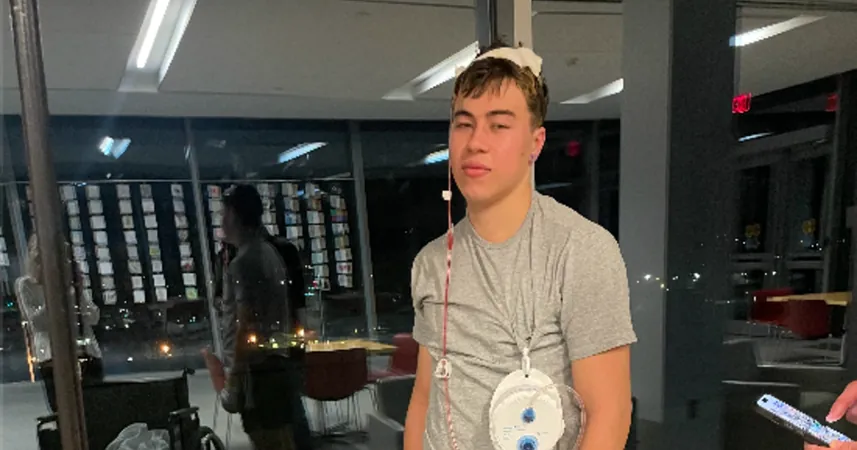
Teen Finds Freedom from Seizures: A Life-Changing Brain Surgery
2024-12-21
Author: Ying
Teen Finds Freedom from Seizures: A Life-Changing Brain Surgery
When Isaac Klapper was just 10 years old, he began experiencing troubling episodes characterized by head twitches and unusual eye movements. Concerned, his pediatrician referred him to a neurologist, who diagnosed him with a movement disorder and prescribed medication. For five years, everything seemed under control—until his sophomore year of high school, when the episodes resurfaced, throwing his daily life into chaos.
Missing out on essential high school experiences, Isaac found himself unable to drive or participate fully in social activities due to the constant fear of an episode occurring at any time. “It was pretty devastating,” Isaac shared. “I couldn’t go anywhere without thinking about the next seizure.”
Witnessing their son’s struggles, Karen and Mark Klapper sought out more answers. After two years of trying various medications with no improvement, they consulted a movement specialist who discovered that Isaac’s condition was misdiagnosed. Instead of a movement disorder, he was experiencing regular seizures. This revelation led the family to the renowned Cleveland Clinic, where Isaac was ultimately diagnosed with epilepsy.
Dr. William Bingaman, a prominent neurosurgeon and head of the epilepsy surgery division at Cleveland Clinic, proposed a groundbreaking treatment option: brain surgery that could potentially eliminate Isaac's seizures altogether. “Saying yes to brain surgery was one of the easiest decisions of my life,” said the now 18-year-old Isaac. “I just couldn't live like this anymore.”
Understanding the Complex Nature of Epilepsy
Epilepsy manifests in various forms, with seizures ranging from minor focal episodes to significant convulsions. According to Dr. Kerri Neville, a pediatric neurologist at the University of Michigan Health C.S. Mott Children's Hospital, the subtleties in seizure types make accurate diagnoses challenging. While some patients can manage their epilepsy with medication, about one-third continue to suffer from seizures despite various treatments.
Surgical options are available for those who do not respond to medications, but these options remain less commonly pursued. In fact, Dr. Bingaman noted that a large percentage of epilepsy patients could benefit from surgery, yet only around 2,000 surgical procedures are performed each year in the U.S, with Cleveland Clinic handling about 500 cases annually.
The Surgery and Its Aftermath
On March 8, 2024, Isaac underwent a five-hour surgery that sought to remove a concerning 'grape-sized abnormality' in his brain detected through advanced scanning technology. The abnormality was located in the left cingulate gyrus, a crucial area of the brain involved in emotional processing and behavior regulation. Post-surgery analysis revealed that it was cortical dysplasia, not a tumor, paving the way for Isaac to enjoy a seizure-free life.
With the abnormality successfully removed, Isaac celebrated his newfound freedom. 'It felt incredible to know that this is probably going to last for the rest of my life,' he stated with enthusiasm. 'I can truly focus on my future without being held back by seizures.'
Isaac is now preparing to apply for colleges, eager to embrace the opportunities life has to offer. His journey underscores the importance of seeking comprehensive medical care and highlights the underutilization of surgical treatments for epilepsy, which could transform the lives of countless individuals currently struggling with this condition.
As Isaac steps into a promising future, his story serves as a powerful reminder of resilience and the pursuit of effective treatments in the face of medical challenges.


 Brasil (PT)
Brasil (PT)
 Canada (EN)
Canada (EN)
 Chile (ES)
Chile (ES)
 España (ES)
España (ES)
 France (FR)
France (FR)
 Hong Kong (EN)
Hong Kong (EN)
 Italia (IT)
Italia (IT)
 日本 (JA)
日本 (JA)
 Magyarország (HU)
Magyarország (HU)
 Norge (NO)
Norge (NO)
 Polska (PL)
Polska (PL)
 Schweiz (DE)
Schweiz (DE)
 Singapore (EN)
Singapore (EN)
 Sverige (SV)
Sverige (SV)
 Suomi (FI)
Suomi (FI)
 Türkiye (TR)
Türkiye (TR)